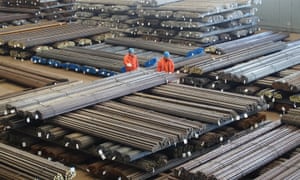The world’s largest steel-producing nations failed to make a breakthrough on the oversupply problem that has thrown the industry into crisis, at a meeting in Brussels.
Ministers from 34 countries, representing 93% of global steel production, attended Monday’s talks, on the day the Chinese state news agency said it was “lame and lazy” to blame China for the problem.
UK Steel, the industry lobby group, criticised the failure to take detailed action, as the future of Britain’s largest steelworks, Port Talbot, hangs in the balance.
The US deputy trade representative, Robert Holleyman, said the talks were not an academic issue “but an exercise dealing with real pain, with real people”.
“We are encouraged by the start of the discussions but we fully believe more most be done and more must be done urgently,” he said.
Overproduction of steel is driving plants around the world out of business and has brought the UK industry to the brink of collapse.
US and European steel producers have accused China of flooding world markets with heavily subsidised steel that makes it impossible for rivals to compete.
But China rejected this argument on Monday, saying the US and European Unionwere “also plagued by overcapacity to differing degrees”. China’s assistant trade minister, Zhang Ji, told ministers that the economic downturn since 2008 and falling demand was “the fundamental reason” behind excess capacity. He also highlighted “geopolitical conflicts, extremism and terrorism” as factors contributing to the problem.
Asked about this part of the Chinese speech, the EU trade representative, Cecilia Malmström, said: “I don’t really see the link to be honest.”
Meanwhile, China’s official state news agency Xinhua said blaming China for global problems in the steel industry was “a lame and lazy excuse for protectionism”.
“Blaming other countries is always an easy, sure-fire way for politicians to whip up a storm over domestic economic woes, but finger-pointing and protectionism are counterproductive,” the agency wrote in an English language commentary.
Although the remarks are not official policy, they are seen as an indication of the mood among China’s ruling class.
But in a tacit acknowledgement that China is producing too much steel, as economic growth rate falters, Beijing promised in February to cut production by 100m-150m tonnes and lay off half a million steelworkers over the next five years.
But no further measures were agreed at the one-day talks in Brussels, which included representatives from China, the US, European Union, Germany and the UK.
The UK business secretary, Sajid Javid, who was at the meeting, said China had “absolutely recognised the problem of overcapacity in their country”. He added: “They’re committing to do something about it and I think that’s a very positive step forward.”
Javid, who has been criticised for not doing enough to protect British steel, said the government had “started to be approached by interested parties” about buying the loss-making Tata plant at Port Talbot in south Wales, but that it was too early to say much more. “The important thing is, as we said all along, we will do everything we can to help with that sales process,” he said.
Tata Steel, the owners of the loss-making plant, and the British government are searching for a buyer, but chances of a rescue for the entire business are seen as remote, putting at risk 40,000 jobs connected to the plant.
Gareth Stace, the director of UK Steel, urged governments to “take rapid and decisive action” or “risk seeing their steel sectors wither on the vine and die”.
He said: “What we needed to see at today’s meeting was an agreement by national governments to take short-term, detailed actions to help address the steel sector crisis. However, having agreed what the problems are we appear to be no closer to finding international action to put in place solutions.”
